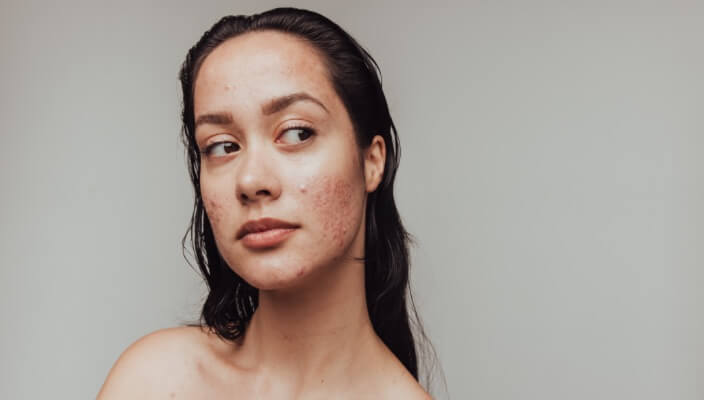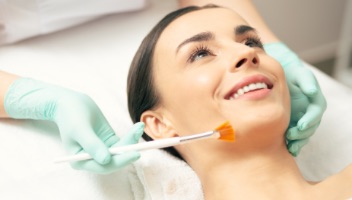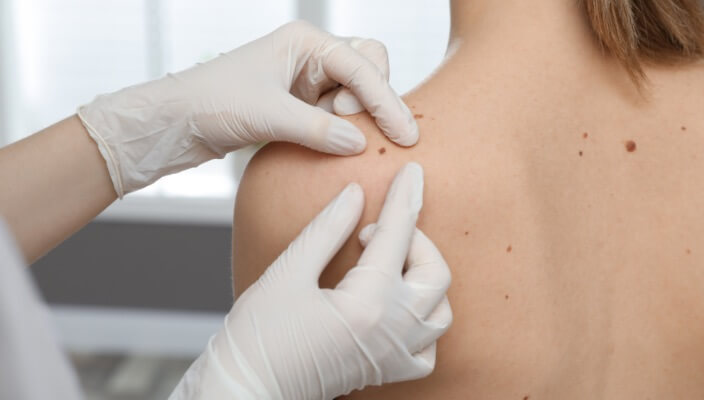Acne Beyond Adolescence
Adult Acne Causes and Treatment Options

Acne, often perceived as a teenage woe, can persist into adulthood, affecting individuals well beyond their adolescent years. Contrary to common belief, adult acne is a prevalent concern for many, impacting self-esteem and quality of life. Understanding its causes, exploring treatment options, and seeking professional guidance, particularly from dermatologists, are pivotal steps in managing and alleviating this condition.
Causes of Adult Acne:
Contrary to popular belief, adult acne doesn't necessarily stem from poor hygiene. Various factors contribute to its onset:
Hormonal Fluctuations: Hormonal imbalances, often observed in women during menstrual cycles, pregnancy, or menopause, can trigger acne outbreaks.Stress: Elevated stress levels can stimulate the release of hormones that prompt the skin to produce more oil, leading to acne.
Diet and Lifestyle: Certain dietary choices, like high glycemic index foods, and lifestyle factors, such as smoking or inadequate sleep, may exacerbate acne symptoms.
Acne Statistics
According to the American Academy of Dermatology Association*:
- Over 50% of women aged 20-29 experience acne.
- About 35% of women and 20% of men aged 30-39 deal with persistent acne.
- Adult acne cases seeking dermatological treatment have been steadily increasing over the past decade.
Tips for Managing Adult Acne
Managing adult acne demands a personalized strategy, considering various effective treatment options. Dermatologists often suggest diverse approaches:
-
Topical Treatments: Dermatologists frequently prescribe topical creams or gels infused with components like retinoids, benzoyl peroxide, or salicylic acid. These aid in unclogging pores and diminishing inflammation, key factors in acne management.
-
Oral Medications: Severe acne cases may warrant oral medications such as antibiotics, birth control pills (for hormonal acne in women), or isotretinoin. These medications tackle acne internally, addressing the root causes and symptoms.
-
Procedures: Dermatological procedures like chemical peels, microdermabrasion, or laser therapy serve as effective measures in acne management and scar reduction. These procedures aim to improve skin texture and appearance while minimizing scarring, especially beneficial for severe or persistent cases of acne.
Watch: Tips for Managing Acne
Role of Dermatologists in Treating Adult Acne
Consulting a dermatologist is crucial for effective management of adult acne. Here's why:
- Accurate Diagnosis: Dermatologists can assess the root cause of acne and recommend tailored treatments, considering individual skin types and conditions.
- Advanced Treatment Options: They have access to a wide array of treatments, including prescription medications and advanced procedures, ensuring a more comprehensive approach.
- Prevention of Scarring: Dermatologists can minimize scarring by providing timely intervention and appropriate treatment, preventing long-term skin damage.
In conclusion, adult acne is a multifaceted concern that requires a holistic approach for effective management. While various factors contribute to its onset, seeking professional guidance from dermatologists, understanding treatment options, and addressing underlying causes can significantly improve outcomes, restoring skin health and confidence for individuals dealing with this persistent condition.
Featured Products for Acne
Check your local office for current stock!
Check your local office for current stock!
Featured Blogs

- General Dermatology
- Skin Care
- Chronic Skin Conditions
We asked one of our skin care professionals for tips on how to clear up acne. Here's what he had to say.
Read More
- Skin Care
- Cosmetic Treatments
Chemical peels emerge as the ultimate winter skincare companion, offering a rejuvenating experience that goes beyond surface-level beauty.
Read More
- Skin Cancer
- General Dermatology
- Skin Exams
Your skin is your largest organ and its first line of defense. Learn more about why a skin exam should be a part of your wellness routine.
Read More


